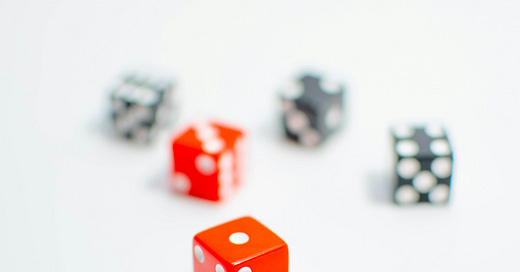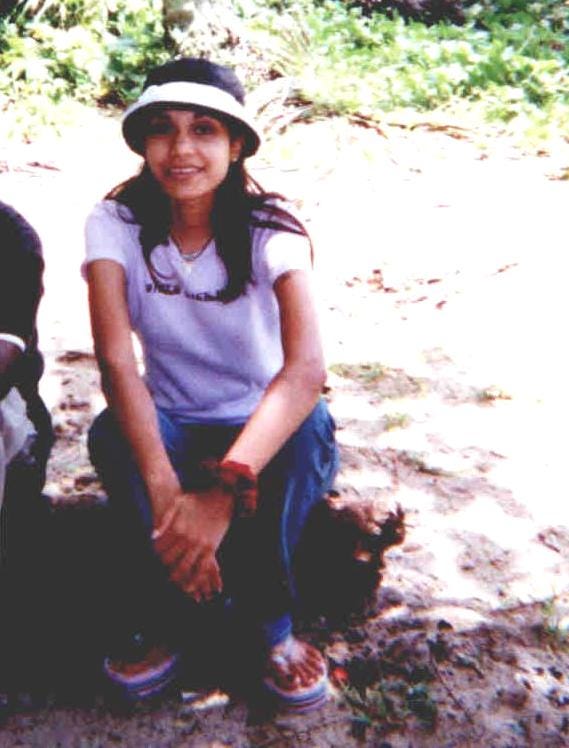Love, Luck, and The Game We Lose
A memoir of family, fate, and second chances
image credit pexels.com
Mom used to say love was like a casino — you keep putting your coins in, hoping for a jackpot that never comes. She’d say this while stirring Sunday lunch, her wedding ring catching light like a lost penny, a smile playing at her lips that never quite reached her eyes.
Even now, years after losing her, I can smell that curry, hear the scrape of her spoon against the pot, and feel the burden of all she tried to teach me about love and loss.
The memory of her is strongest in kitchens — not the sleek one in my apartment now, but any kitchen that smells like warm spices and sacrifice.
I sometimes catch myself reaching for phantom coffee tins, muscle memory from watching her hide money behind the flour, the rice, and her prayers.
Dad would find them anyway.
Love made her predictable, and addiction made him thorough.
She’d cry in the kitchen late at night, thinking we couldn’t hear. But in our tiny house in Trinidad, sorrow traveled through walls like radio waves.
Isn’t it funny how grief makes archaeologists of us all?
We keep digging up memories, dusting them off, trying to piece together the artifacts of life we can’t get back.
Fortune’s fool
Dad chased luck like some men chased women. He disappeared for days, resurfacing with empty pockets and promises that smell like cigarettes and desperation. “This time, it’s different,” he says to no one now.
Mom’s not there to nod anymore, to stir that pot until her arm aches, to believe him because not believing meant facing a truth she wasn’t ready to see.
The day I found those empty tins was the day something in me cracked.
Not broke — breaking would come later — but cracked, like ice on a pond when winter’s not quite ready to let go. I was fourteen, and I finally understood that love wasn’t just blind; it was fucking stupid.
Chemical odds
By 2002, I had mastered the art of smiling while drowning. Trinidad’s heat pressed against my skin like a heavy blanket, but I felt cold inside.
The cold that seeps into your bones and makes a home there, even in the Caribbean sun. I remember counting out the pills in my palm like someone counting cards, each one a tiny white promise of silence.
The darkness that night wasn’t like the comfortable darkness of my grandmother’s kitchen. It was absolute, permanent, the kind that promises to swallow everything: pain, shame, the image of my mother’s face when she found another empty tin, my father’s trembling hands as he swore “never again.”
I thought about probability, about chemical reactions, about the mathematical certainty of organs shutting down.
Here’s something they don’t tell you about attempting suicide: time moves differently. Each pill was a second, was an hour, was an eternity. Like playing solitaire with a deck that keeps changing suits.
They found me
Someone always finds you in Trinidad. The island was too small for secrets, too close-knit for solitude. Hands like my mother’s — strong, steady, haunted by their own demons, forced charcoal down my throat.
Words floated above me like lost bets, like my mother’s prayers, like all the things we say when we’re trying to save someone else because we couldn’t save the ones who came before.
Those coffee tins stayed in Trinidad when I left, when Mom left this world, when everything changed, and nothing changed at all. Dad keeps his herbs in them now — basil, thyme, the ghost of hope.
He still gambles, but smaller now. Scratch tickets instead of poker games. Dollar bets instead of life savings. He lives alone with his regrets and her memory, both too heavy to carry and too precious to put down.
Sometimes, I dream of Sunday curry. In these dreams, Mom’s still stirring, still believing, still alive. The kitchen smells like cilantro and garlic and second chances.
I try to tell her everything, about leaving Trinidad, about the life I’ve built, about how I finally understand what she meant about love and casinos.
But dream-mom just smiles that same smile that never quite reaches her eyes and keeps stirring.
Photo of the author - July 2002
(reading the last section here in my own voice)
Borrowed light
The thing about darkness is that it teaches you to see differently. In a casino, there are no clocks, no windows, no way to tell if it’s day or night. In grief, time works the same way.
But if you stay long enough, your eyes adjust.
You start to see outlines, shapes, and silhouettes of other people, and also learn to see in the dark.
I still collect shadows, still see the darkness in people. But now I also see the light they carry, sometimes so carefully, like gamblers protecting their last chip.
My mother’s love is preserved in memory like pressed flowers. My father’s attempts at redemption are small but steady as heartbeats. My own daily decision to stay, to bet on another tomorrow.
We’re all gambling with borrowed time, borrowed hope, borrowed light.
The trick isn’t to win.
The trick is to keep playing, even when the house always wins, even when the odds feel stacked, even when the darkness feels like home.
Some nights, I still count my breaths like cards, like coins, like chances. But now I know — sometimes the bravest bet you can make is on yourself.
And sometimes, in the silence between breaths, I swear I can still smell curry, can still hear Mom’s voice saying, “Child, you were always worth more than any fucking jackpot.”
Thank you for taking the time.
You can also follow me on LinkedIn and Medium.
WorkmanShit is a reader-supported publication.
To support my coffee habit, consider becoming a free or paid subscriber.
See discounted rates below:
$3 per month – The caffeine tease, just enough to make me hopeful
$4 per month – You’ve funded ¾ of a latte and 100% of my gratitude
$5 per month – You’re basically a fucking saint
Thank you so much in advance.








Oh wow, I’m so sorry things became that dark for you, Neela. I’m glad they found you because the world would be a much darker place without you in it. I bet your mom’s so proud, looking down as you continue to play the game. And I bet her smile finally reaches her eyes 💜
I loved reading this story and your evocative prose, and hearing the borrowed light in your own voice. Powerful, and the ending breathes me forward - And sometimes, in the silence between breaths, I swear I can still smell curry, can still hear Mom’s voice saying, “Child, you were always worth more than any fucking jackpot.”
This is better than any adjective like authentic or relatable. It just feels true.